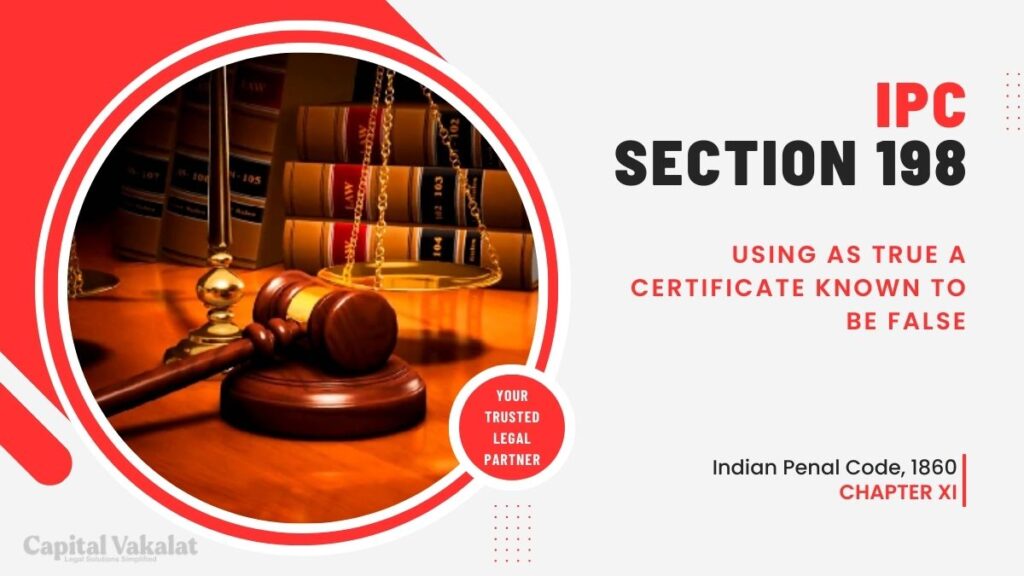Section 198 of the Indian Penal Code (IPC) is a crucial legal provision that pertains to the use of false certificates. The use of a certificate known to be false can have significant legal consequences.

This article aims to shed light on the implications of Section 198 IPC and the legal intricacies surrounding false certificates.
Understanding the Importance of Certificates
Certificates serve as documentary evidence of various qualifications, achievements, and personal details. They play a pivotal role in an individual’s life, ranging from academic certificates issued by educational institutions to professional certifications and personal identification documents. These certificates hold value and are often required for different purposes, including employment, education, and legal matters.
The Relevance of Section 198 IPC
Section 198 of the IPC primarily deals with cases where individuals use false certificates with the intention of deceiving or gaining an unfair advantage. This section exists to protect the integrity of certificates and to ensure that individuals do not misuse them for personal gain.
What Constitutes a False Certificate
A false certificate, under Section 198 IPC, is one that is intentionally fabricated or altered to present false information. This can include fake educational certificates, forged identity documents, or any other form of deceitful documentation.
Legal Ramifications of Using a False Certificate
Using a false certificate can lead to severe legal consequences. Offenders may be charged with fraud, forgery, and other relevant sections of the IPC, depending on the nature and purpose of the false certificate. The penalties can range from fines to imprisonment, and in some cases, both.
The Process of Initiating Legal Action
To initiate legal action under Section 198 IPC, the concerned authorities or affected parties need to file a complaint with the police. The police then conduct an investigation to gather evidence, and if a case is established, it is forwarded to the judiciary for trial.
Notable Cases of False Certificates under Section 198 IPC
Several high-profile cases have brought Section 198 IPC into the limelight. These cases involve individuals using false certificates to secure jobs, admissions, or other privileges. The legal proceedings in these cases serve as a deterrent to potential offenders.
Implications for Educational and Professional Institutions
The misuse of certificates places educational and professional institutions under scrutiny. They are expected to have robust verification processes in place to prevent the issuance of false certificates. Failing to do so may lead to reputational damage and legal consequences.
Importance of Verification Procedures
To combat the misuse of certificates, it is essential for institutions to implement stringent verification procedures. These procedures include cross-checking information with issuing authorities, maintaining a database of genuine certificates, and conducting thorough background checks.
Measures to Prevent the Misuse of Certificates
Preventing the misuse of certificates is a shared responsibility. Individuals should be cautious when verifying the authenticity of certificates they receive. Likewise, institutions must ensure the accuracy and security of certificates they issue.
Penalties for Offenders
Section 198 IPC clearly states the penalties for offenders. Depending on the gravity of the offense, offenders may face fines, imprisonment, or both. These penalties are in place to deter individuals from engaging in such fraudulent activities.
The Role of the Police and Judiciary
The police play a vital role in investigating cases related to false certificates, while the judiciary ensures that due process is followed in legal proceedings. The cooperation between law enforcement agencies and the judiciary is crucial in upholding justice.
Raising Awareness and Reporting False Certificates
Raising awareness about the consequences of using false certificates is essential. Additionally, it is important for individuals and institutions to report any suspicions or instances of false certificates to the authorities.
Challenges in Prosecuting False Certificate Cases
Prosecuting false certificate cases can be challenging due to the need for substantial evidence. In many instances, gathering evidence to prove the fraudulent nature of a certificate can be a complex and time-consuming process.
Conclusion
Section 198 IPC serves as a legal safeguard against the misuse of certificates. It underscores the importance of maintaining the integrity of certificates and ensures that those who use false certificates for their gain are held accountable. The legal repercussions and penalties associated with this offense send a clear message that dishonesty will not go unpunished.
Frequently Asked Questions
Are there any exceptions to Section 198 IPC?
Section 198 IPC applies to all cases involving false certificates, with limited exceptions in specific circumstances.
How can individuals protect themselves from falling victim to false certificates?
Individuals should exercise caution when verifying certificates and ensure they are obtained from reputable sources.
What role do educational institutions play in preventing the misuse of certificates?
Educational institutions should have robust verification procedures in place to minimize the issuance of false certificates.
Can a false certificate case be resolved outside of the legal system?
False certificate cases are generally addressed through the legal system, as they involve criminal offenses and potential fraud.